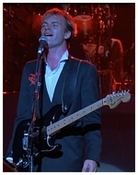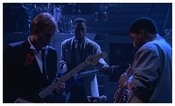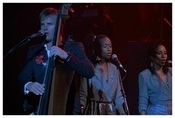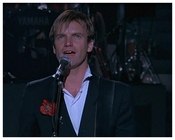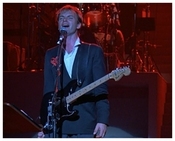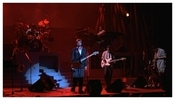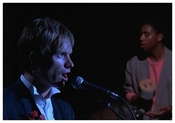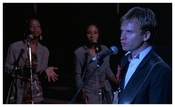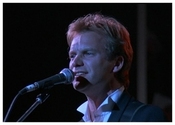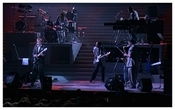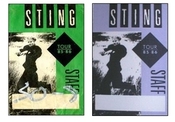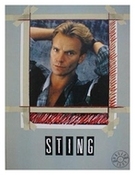
Sting fumbles with jazz fusion...
Sting on his own? Just what the world needs... another pompous British rock star.
For his first solo work since the Police more or less broke up two years ago, singer-composer Sting chose to work with some of the finest young turks of jazz fusion.
Any succulent thoughts of some kind of inspired marriage of Sting's often irresistible melodics and the high-tech polish of these progressive virtuosos vanished shortly after the band started playing Friday at UC Berkeley's Greek Theater.
Sting hamstrung the fusion firebrands with some dreadfully pedestrian material, which showed neither the instrumentalists nor Sting to best advantage. The man who wrote all those memorable songs on 'Synchronicity', the last Police album, undermined his own best musical instincts to accommodate the spare helpings of jazz infused by the band, while the musicians were never cut loose to do what they do best.
The meeting of the minds never took place.
Most of the two-hour-plus program was drawn from the recent Sting solo debut LP, 'The Dream of the Blue Turtles'. The title alone should have served as a warning.
Solo bandleader Sting does not play bass this time around; he plays guitar, although not so you notice it. He interspersed a few lesser known Police songs, sang a stark 'Roxanne' during the encores, and played to the screaming teenyboppers in the crowd with his rock star bag of tricks.
Saxophonist Branford Marsalis of the distinguished family of New Orleans jazz musicians looked distinctly ill at ease doing the boogaloo between solos.
Sting's rhythm section featured Omar Hakim, drummer for fusion kingpins Weather Report, and bassist Darryl Jones of the Miles Davis band. These exquisitely proficient technicians never found any kind of satisfactory groove, unaccustomed as they are to the restraint of self-expression imposed by the rudimentary 4/4 beat of rock. They also unwittingly pointed up the significant role played in the Police by drummer Stewart Copeland.
Sting and the Police burst on a turgid rock scene in the late '70s, an era dominated by overbearing, witless rock by groups like Styx and REO Speedwagon. The trio was a refreshing blast from England's burgeoning new wave scene with a spare and supple, reggae-infused style.
The Police became the first new waveers to break the American radio barrier and, subsequently, the first new wave band to climb to the level of selling out baseball stadiums. Sting, bassist, vocalist and songwriter, became the popular focal point, with his matinee-idol looks and quotable interviews.
For Sting, the jumbled sound of his new group may represent a kind of ultra-hip fashion, trying to be one step ahead of the crowd, testing what might be laughingly called artistic growth.
Or it could be a bluff.
How could he have hoped to rectify the expectations of his youthful following with the pseudo-sophistication of his new act? While the most enthusiastic fans jammed up against the stage Friday, shrieking and screaming, the patrons sitting further away on the hill couldn't conceal their boredom.
(c) The San Francisco Chronicle by Joel Selvin
Sting on his own? Just what the world needs... another pompous British rock star.
For his first solo work since the Police more or less broke up two years ago, singer-composer Sting chose to work with some of the finest young turks of jazz fusion.
Any succulent thoughts of some kind of inspired marriage of Sting's often irresistible melodics and the high-tech polish of these progressive virtuosos vanished shortly after the band started playing Friday at UC Berkeley's Greek Theater.
Sting hamstrung the fusion firebrands with some dreadfully pedestrian material, which showed neither the instrumentalists nor Sting to best advantage. The man who wrote all those memorable songs on 'Synchronicity', the last Police album, undermined his own best musical instincts to accommodate the spare helpings of jazz infused by the band, while the musicians were never cut loose to do what they do best.
The meeting of the minds never took place.
Most of the two-hour-plus program was drawn from the recent Sting solo debut LP, 'The Dream of the Blue Turtles'. The title alone should have served as a warning.
Solo bandleader Sting does not play bass this time around; he plays guitar, although not so you notice it. He interspersed a few lesser known Police songs, sang a stark 'Roxanne' during the encores, and played to the screaming teenyboppers in the crowd with his rock star bag of tricks.
Saxophonist Branford Marsalis of the distinguished family of New Orleans jazz musicians looked distinctly ill at ease doing the boogaloo between solos.
Sting's rhythm section featured Omar Hakim, drummer for fusion kingpins Weather Report, and bassist Darryl Jones of the Miles Davis band. These exquisitely proficient technicians never found any kind of satisfactory groove, unaccustomed as they are to the restraint of self-expression imposed by the rudimentary 4/4 beat of rock. They also unwittingly pointed up the significant role played in the Police by drummer Stewart Copeland.
Sting and the Police burst on a turgid rock scene in the late '70s, an era dominated by overbearing, witless rock by groups like Styx and REO Speedwagon. The trio was a refreshing blast from England's burgeoning new wave scene with a spare and supple, reggae-infused style.
The Police became the first new waveers to break the American radio barrier and, subsequently, the first new wave band to climb to the level of selling out baseball stadiums. Sting, bassist, vocalist and songwriter, became the popular focal point, with his matinee-idol looks and quotable interviews.
For Sting, the jumbled sound of his new group may represent a kind of ultra-hip fashion, trying to be one step ahead of the crowd, testing what might be laughingly called artistic growth.
Or it could be a bluff.
How could he have hoped to rectify the expectations of his youthful following with the pseudo-sophistication of his new act? While the most enthusiastic fans jammed up against the stage Friday, shrieking and screaming, the patrons sitting further away on the hill couldn't conceal their boredom.
(c) The San Francisco Chronicle by Joel Selvin


